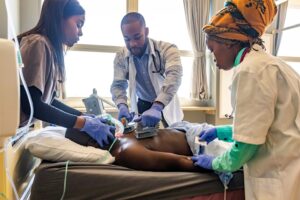News
The Cape Town declaration on access to cardiac surgery in the developing world.
Co-signed by TEAMFund
August 13, 2018

The Mission: To urge all relevant entities within the international cardiac surgery, industry, and government sectors to commit to develop and implement an effective strategy to address the scourge of rheumatic heart disease in the developing world through increased access to life-saving cardiac surgery. Twelve years after cardiologists and cardiac surgeons from all over the world issued the ‘‘Drakensberg Declaration on the Control of Rheumatic Fever and Rheumatic Heart Disease in Africa,’’ calling on the world community to address the prevention and treatment of rheumatic heart disease (RHD) through improving living conditions, to develop pilot programs at selected sites for control of rheumatic fever and rheumatic heart disease, and to periodically review progress made and challenges that remain, RHD still accounts for a major proportion of cardiovascular diseases in children and young adults in lowand middle-income countries, where more than 80% of the world population live. Globally equal in prevalence to human immunodeficiency virus infection, RHD affects 33 million people worldwide. Prevention efforts have been important but have failed to eradicate the disease. At the present time, the only effective treatment for symptomatic RHD is open heart surgery, yet that life-saving cardiac surgery is woefully absent in many endemic regions. In this declaration, we propose a framework structure to create a coordinated and transparent international alliance to address this inequality. Elimination of RHD and relief from its debilitating consequences can only occur through interdisciplinary effort, as outlined in the Cairo Accord. Previous initiatives have focused on primary and secondary prevention of RHD. Their declarations have been recognized by the Heads of State of African Union countries and by the World Health Organization. This recognition has been important in developing recommendations by the World Health Organization Executive Board to the 2018 World Health Assembly to enlist global commitment to RHD. Progress in prevention of RHD has been slow during the past 15 years, and thus, surgery will likely remain an integral part of RHD treatment for several generations. Lack of access to cardiac surgery services and the cost of valve replacement render this disease fatal for millions of patients. In endemic regions of low-income countries, the need for cardiac surgery is estimated at 300 operations per 1 million population.